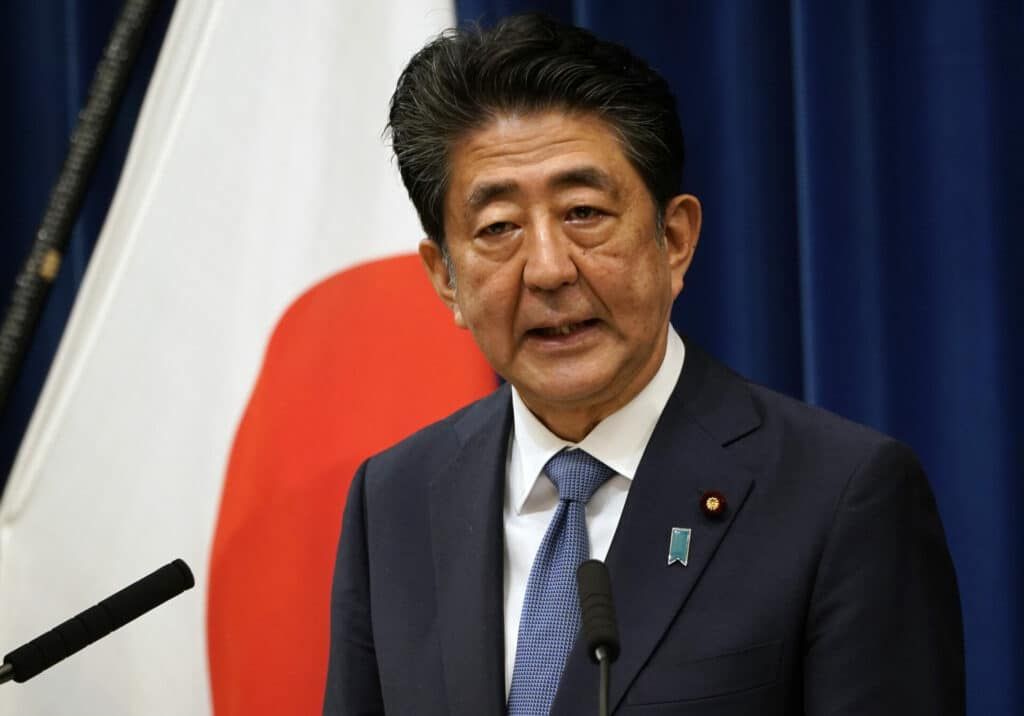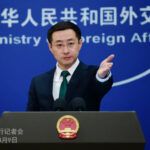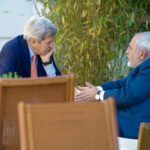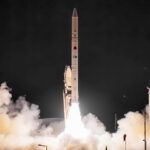The legacy of Shinzo Abe: a Japan divided about nuclear weapons
By Sayuri Romei | August 24, 2022
 Japan's Prime Minister Shinzo Abe announced his resignation due to health concerns on August 28, 2020. Shinzo Abe was assassinated while giving a speech at an election rally on July 8, 2022 in Nara, Japan. (Photo by Franck Robichon - Pool/Getty Images)
Japan's Prime Minister Shinzo Abe announced his resignation due to health concerns on August 28, 2020. Shinzo Abe was assassinated while giving a speech at an election rally on July 8, 2022 in Nara, Japan. (Photo by Franck Robichon - Pool/Getty Images)
On August 1, Prime Minister Fumio Kishida became the first Japanese leader to ever attend the Review Conference for the Treaty on the Non-Proliferation of Nuclear Weapons (NPT), which is taking place this month at UN headquarters in New York. Kishida, whose family hails from Hiroshima, is one of the very few voices within Japan’s ruling party, the Liberal Democratic Party (LDP), to consistently emphasize the humanitarian impacts of the use of nuclear weapons and Japan’s unwavering commitment to nuclear disarmament. This contrasts with his most-recognized predecessor, former Prime Minister Shinzo Abe, whose assassination on July 8, 2022, shocked the entire world.
Abe’s views about nuclear weapons. Shinzo Abe was known to hold views that underscored the effectiveness of nuclear deterrence and the usefulness of nuclear weapons. He even hinted at the possibility that Japan could one day acquire such weapons. During his eight years as prime minister, Abe made Japan’s ambivalent nuclear policy emphasize the importance of the US nuclear umbrella. In doing so, he shifted further away from the brief momentum in favor of nuclear disarmament created by former US President Barack Obama and Abe’s predecessors. From 2012 to 2020, Abe’s second term[1] was marked by heightened tensions and a rapidly deteriorating regional security environment—from China’s aggressive military buildup advancing claims in the East China Sea to North Korea’s increasing nuclear and missile capabilities. In February 2017, during a visit to US President Donald Trump in Washington, Abe successfully obtained reassurance about the unwavering “U.S. commitment to defend Japan through the full range of U.S. military capabilities, both nuclear and conventional.” One year later, in another remarkable sign of Abe’s focus on the role of nuclear weapons, his Foreign Minister Taro Kono issued swift and unequivocal praise of President Trump’s Nuclear Posture Review.
The increasingly tense regional security environment over the past 10 years may certainly have influenced the Abe government’s nuclear views. But Abe’s focus on nuclear weapons started before 2012. Shinzo Abe’s political rhetoric certainly caused several uproars among the Japanese public throughout his political career. But its analysis provides a useful glimpse into his and his party’s nuclear thinking. In one famous example, in May 2002, Shinzo Abe reportedly told students at Waseda University: “The possession of nuclear bombs is constitutional, so long as they are small.”[2] Then Japan’s deputy chief cabinet secretary, Abe was undeterred by the public outcry that followed his remarks and will maintain his views for the rest of his career.
Two decades later, as Russia was invading Ukraine, Shinzo Abe said on television that Japan needs to discuss the option of a NATO-style nuclear-sharing agreement with the United States. This was an apparent revision by Abe of the third principle of Japan’s Three Non-Nuclear Principles, which states Japan shall never permit the introduction of nuclear weapons into its territory. Japan’s Three Non-Nuclear Principles of not possessing, not producing, and not introducing nuclear weapons were established in 1967 by Prime Minister Eisaku Sato, Abe’s great-uncle. Although these principles were never made into law, they are still viewed as the cornerstone of Japan’s official nuclear policy to this day.
In his February 2022 television interview, Abe did try to stand by these principles, saying: “Japan is a party to the Nuclear Non-Proliferation Treaty (NPT) and has the Three Non-Nuclear Principles. As a country that has suffered atomic bombings, it is important to move toward the goal of nuclear abolition.” Still, his remarks about nuclear sharing were harshly criticized by the Hibakusha community—the survivors of the atomic bombings of Hiroshima and Nagasaki in August 1945.
A long political tradition of rhetorical ambivalence. Shinzo Abe’s positive view about the potential value of nuclear weapons for Japan was certainly not unique among Japanese politicians and has been shared by many within the LDP. Several of Abe’s government ministers spoke publicly in favor of the nuclear option or answered that “Japan should consider acquiring nuclear weapons if the international situation calls for it” in surveys by the Mainichi Shimbun, one of Japan’s major newspapers. These included Abe himself, former Deputy Prime Minister Taro Aso, and five former defense ministers. Shinzo Abe’s younger brother and current Defense Minister Nobuo Kishi gave the same response to the Mainichi survey in 2012, although in 2020 he ruled out the nuclear option and publicly supported the Three Non-Nuclear Principles.
Abe’s 2002 assertion about the legality of possessing nuclear weapons under the Japanese Constitution has been made several times by Japanese politicians since the 1950s. For instance, Prime Minister Nobusuke Kishi—Abe’s grandfather—stated in May 1957 during a session of the Diet (Japan’s parliament) that the postwar Constitution did not explicitly forbid Japan from possessing nuclear weapons if they were small. This caused several members of the Diet to interrogate Kishi at the time. Later, during a Diet session in April 1968, a socialist member asked State Minister Kaneshichi Masuda to clarify his position on Japan’s security arrangement with the United States, to which Masuda responded, I translate, “the Constitution, indeed, does not forbid Japan to possess tactical nuclear weapons if they’re solely for self-defense. … Just like the Constitution does not forbid the entry of another country’s nuclear weapons.” But Masuda immediately added that the Three Non-Nuclear Principles are here to cover that loophole.
In March 1973, Prime Minister Kakuei Tanaka also reaffirmed the Three Non-Nuclear Principles. But this time, he added that “while [Japan is] not able to have offensive nuclear weapons, we are not saying that we will have no nuclear weapons at all.” “[S]trategic nuclear weapons are offensive in character and tactical nuclear weapons are defensive,” Tanaka explained, and “defensive nuclear weapons are constitutional.” A similar argument was made by Prime Minister Takeo Fukuda in 1978 during a Diet debate: “[A]rticle 9 of the Constitution does not prohibit the possession of nuclear weapons by Japan. Japan can have them if their purpose is for a minimum level of defense. However, Japan also has the Three Non-Nuclear Principles.”
Shinzo Abe’s position of questioning the limits of Japan’s non-nuclear policy is therefore part of a long political tradition advancing the idea that nuclear weapons might be a possibility for Japan.
Getting rid of Japan’s non-nuclear policy? The long-standing reluctance by Japanese elites to publicly discuss nuclear weapons for Japan, called “the nuclear taboo,” derives from the strong public aversion to such weapons. This aversion was amplified after the Lucky Dragon no. 5 incident on March 1, 1954, when a Japanese fishing boat was contaminated by the nuclear fallout from the US nuclear test at Bikini Atoll. From that day, whenever a Japanese politician even mentioned nuclear weapons, the public reacted very strongly and stayed skeptical of any rhetoric that might suggest the non-nuclear principles and Japan’s status as a Hibakukoku—a country that suffered atomic bombings—not be upheld. Japanese officials and LDP members together have lamented that discussions over a nuclear Japan are still considered taboo. Former Defense Minister Shigeru Ishiba commented in 2017: “How can we take any responsibility if the Three Non-Nuclear Principles are actually four: not possessing, not producing, not introducing, and not even discussing nuclear weapons?” The gap between what the public expects Japanese politicians to say—and not say—and the LDP’s rhetoric about nuclear weapons truly reveals the ambivalence of the country’s official nuclear policy, which has been in place since the end of World War II.
In an ill-timed and bold rhetorical shift, however, Abe omitted the usual pledge to uphold the Three Non-Nuclear Principles in his Hiroshima speech on August 6, 2015. The omission, during the official ceremony commemorating the 70th anniversary of the atomic bombings, caused great anxiety among many and prompted angered responses from the Hibakusha community. Anti-nuclear activist and Hibakusha Tomoyuki Mimaki noted: “It seems like the government is disrespecting the Three Non-Nuclear Principles.” Another activist, Kazuo Okoshi, commented: “Some politicians advocate for nuclearization. This is proof that the Three Non-Nuclear Principles are weakening.” Probably in response to the public outcry following his omission, Abe did mention the Three Non-Nuclear Principles in his speech in Nagasaki three days later. In doing so, Abe was reassuring the Japanese that there would be no change to the official nuclear policy.
This long history of mixed messages and rhetorical mishaps by leaders of Japan’s ruling party can be read as the inevitable consequence of the country’s ambiguous nuclear policy, swinging between effective nuclear deterrence and global nuclear disarmament aspirations. But this posture can be also understood as creating a hedging strategy about nuclear weapons perceived as necessary by many within the LDP. Politicians of the ruling party may indeed have seen it as advantageous for Japan to flash the “nuclear card” from time to time while still referring to the Three Non-Nuclear Principles.
Talking to different audiences. The ambivalent nature of Japan’s nuclear policy may appear useful in catering to different audiences at home and abroad. The first and most obvious audience intended to receive signaling about the nuclear card consists of Japan’s regional adversaries, especially China. Statements about the constitutional right to possess nuclear weapons exemplify such rhetoric and are partly aimed at keeping Japan’s adversaries uncertain about their neighbor’s ultimate security intentions. As former Executive Director of the International Energy Agency Nobuo Tanaka wrote in 2018: “[G]iven recent geopolitical developments in Northeast Asia, eliminating Japan’s nuclear capability could be very unwise. If so, whether and how we should maintain Japan’s nuclear capability needs to include the national security perspective as part of a serious public discussion. Japan will never ever build nuclear weapons, and yet being suspected of doing so by some of its neighbors, is probably the strongest national security reason for Japan to continue to use nuclear power.”
The second audience is domestic. Japan is widely viewed as a nuclear threshold state, as it has significant latent capabilities due to its highly advanced nuclear fuel cycle technologies. That Japan refuses to develop nuclear weapons despite its latent nuclear status has been used by Japanese officials to reassure the public about the security of the archipelago, while keeping its moral stance vis-à-vis global peace. Possessing latent nuclear capabilities yet not going nuclear is indeed considered proof that Japan is an international role model and fits in the official narrative that Japan is a bridge-builder between nuclear and non-nuclear states. At the same time, because this rhetoric is ambiguous, it also provides Japanese leaders with another way to remind the public of the country’s potential to go nuclear, if it decides to.
The first recorded instance of such reassurance discourse dates from 1958. In his memoirs published in 1983, Prime Minister Nobusuke Kishi wrote after a visit to the new Tokai-mura nuclear facility “Japan does not have nuclear weapons, but by showing that we possess the technology to build them, we can increase our political leverage at the international level when it comes to disarmament issues and nuclear testing.”
A more explicit version of this argument features in a Diet debate in October 2006, when Akira Amari, minister of economy, trade, and industry under Shinzo Abe’s first premiership, stated, I translate: “Japan has the capabilities [to go nuclear], but doesn’t. The fact that Japan declares that it has no intention of doing so while maintaining those capabilities is what truly makes Japan’s policy convincing. If a country that doesn’t have the capabilities to go nuclear declares that it will not go nuclear, it is just lip service. However, Japan does have the technical capabilities, yet it asserts that it will not go nuclear: this is exactly what makes Japan a credible and persuasive advocate for the abolition of nuclear weapons around the world.” In other words, retaining nuclear latency adds credibility to disarmament matters.
The third audience is the United States, with which Abe has been particularly keen to engage. On some occasions, nuclear statements made by Japanese officials have alluded to a “nuclear option.” These were directed to the United States and meant to test its commitment to defend Japan. Commenting on North Korea’s nuclear test and ballistic missile launch of early 2016, Abe stated, in presence of US Pacific Commander Admiral Harry Harris, that “[t]he missile launch by North Korea was not only a direct threat to Japan but also a challenge to the United States.” Japanese political scientist Shogo Imoto commented at the time: “It is clearly an exaggeration to state that Mr. Abe is thinking of nuclear weapons for Japan. However, I interpret [his quote] as the following: ‘If the United States abandons Japan now and runs away from the North Korean threat, Japan will seriously consider a shift in its policy and nuclearize. Japan wants the United States to be fully aware of this as you tackle the North Korean issue.’”
These messages have appeared each time Japan felt its regional environment was becoming more challenging, as happened in December 1964 when Japan’s Prime Minister Eisaku Sato reportedly told US ambassador Edwin Reischauer that Japan could develop nuclear weapons. Sato’s remarks were made after China had conducted its first successful nuclear bomb test in October 1964.
The fourth and last audience is the most conservative part of the Japanese public. Using the slogan “Take Japan back” (Nippon wo torimodosu), Abe’s campaign for a second term appeared to go beyond the mainstream conservatism of LDP politicians and revealed the prime minister’s overtly nationalistic values and agenda. When Abe rose to power for the second time in 2012, many Japanese and international analysts warned about his revisionist and nationalist views and the regional instability they could cause. Some analysts even labeled Abe as “the most conservative leader in Japan’s postwar history.” Abe, however, quickly managed to eclipse his nationalist label by skillfully handling newly elected US President Donald Trump and even enjoyed a new reputation as a proactive diplomat seeking engagement and mediation. But in the nuclear rhetoric of Shinzo Abe, as of his closest allies, one could still find hints and allusions to nuclear weapons’ prestige and relevance to international politics.
Abe’s nuclear legacy. The deeply ambivalent messages that paved Abe’s political career point to the perception by LDP leaders that a nuclear stance needs to simultaneously address all four audiences—adversaries, allies, the Japanese public, as well as its most conservative fraction. But Shinzo Abe’s views on nuclear weapons do not only reflect the longstanding strategy of his party. His continued, strong emphasis on the need for nuclear deterrence also resulted in a sharper divide and a greater hostility between the government and largely anti-nuclear public opinion in Japan. Moreover, even though Abe’s views were not at odds with the LDP, his government’s reliance on nuclear deterrence uniquely contributed to consolidating Japan’s nuclear hedging posture even further. The delays and hesitation by Abe’s government in presenting a clear roadmap for the management of the country’s plutonium stockpile as well as its nuclear energy policy also exacerbated the distrust of the public, still embittered by how the government managed the aftermath of the 2011 Fukushima nuclear disaster.
Japan’s current prime minister, Fumio Kishida, is now highlighting Japan’s goal of nuclear disarmament and publicly rejected Abe’s idea of nuclear sharing. But the country’s nuclear hedging posture is so entrenched in the political thinking of the LDP’s leadership that it is highly unlikely Japan’s ambivalent nuclear policy will change in the foreseeable future.
Kishida’s speech on August 1 at the United Nations on the first day of the NPT Review Conference already drew harsh criticism from the Hibakusha community for failing to mention the Treaty on the Prohibition of Nuclear Weapons (TPNW, also called the “ban treaty”) and for not clarifying Japan’s future role in nuclear disarmament. Kishida’s efforts to re-center the country’s nuclear policy towards disarmament may be sincere, but it will have to overcome the wide gap between the public and the government that Abe’s focus on nuclear deterrence further exacerbated.
Through his security-oriented nuclear views, Shinzo Abe attempted to diminish the Japanese public’s long-standing allergy to and the country’s emotional wounds over nuclear weapons. However, his nuclear legacy has created an even wider divide in Japan—between those who think of nuclear policy exclusively in terms of disarmament and those who prefer emphasizing Japan’s deterrence needs. How Abe’s nuclear legacy will impact the future of nuclear policy in Japan—in one direction or another—is an open question.
Notes
[1] Shinzo Abe served four terms as prime minister of Japan, in 2006–2007, 2012–2014, 2014–2017, and 2017–2020. His last three contiguous terms from 2012 to 2020 are often referred to as his “second term.” Abe has been the longest-serving prime minister in Japan to date.
[2] What Shinzo Abe is reported to have said is not entirely clear. Some news outlets report that he said: “There is no problem with atomic bombs, constitutionally speaking. As long as they’re small.” (Wall Street Journal Japanese version) Others state he said: “The possession or use of nuclear weapons is not a problem constitutionally, as long as they’re small” (Sunday Mainichi magazine). As this was an oral remark at an event at Waseda University, it is difficult to know what Abe said exactly. In any case, his remarks were later criticized very harshly by the Japanese public.
Together, we make the world safer.
The Bulletin elevates expert voices above the noise. But as an independent nonprofit organization, our operations depend on the support of readers like you. Help us continue to deliver quality journalism that holds leaders accountable. Your support of our work at any level is important. In return, we promise our coverage will be understandable, influential, vigilant, solution-oriented, and fair-minded. Together we can make a difference.
Keywords: Hiroshima, Japan, NPT Review Conference, Nagasaki, atomic bombing, atomic survivors, hibakusha
Topics: Nuclear Weapons















Japan doesn’t trust the US to protect her against nuclear attack.
Abe an enlightened nationalist must have been disillusioned with the USA’s track record with and in Ukraine ; having enticed a nuclear Ukraine to give up its nukes in favour of the mutual security guarantees of both U.S. and Russia, the US gradually left it exposed to Russian covert and overt pressures. Japan being another vulnerable neighbour of Russia shouldn’t be put to a similar situation, Abe could have reasoned and justifiably so. He is definitely a great Japanese of whom the Shinto emperor would rightly be proud of !